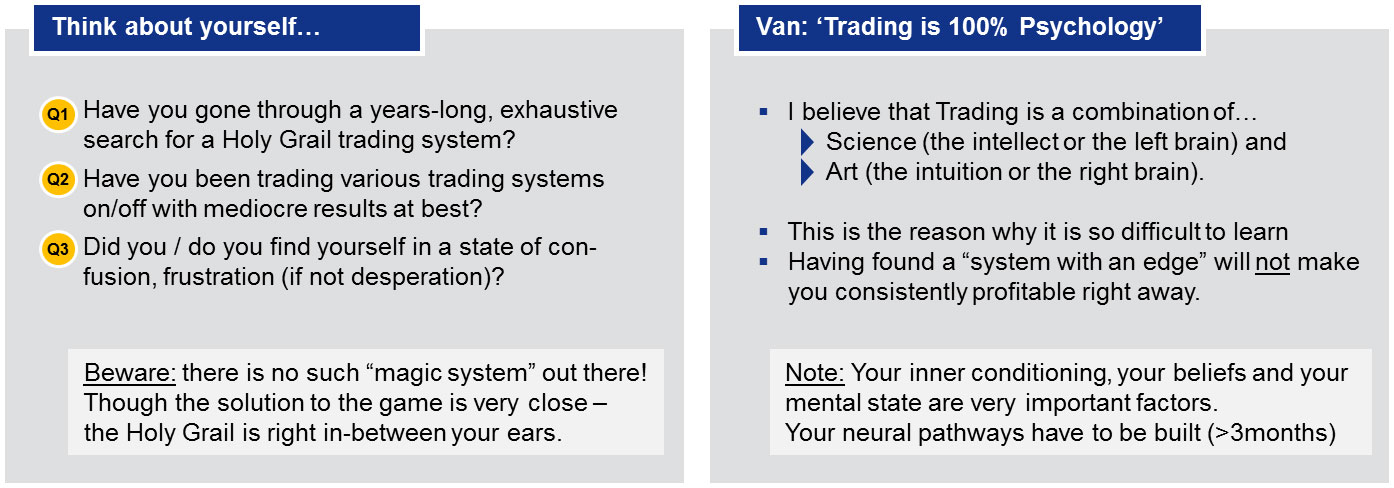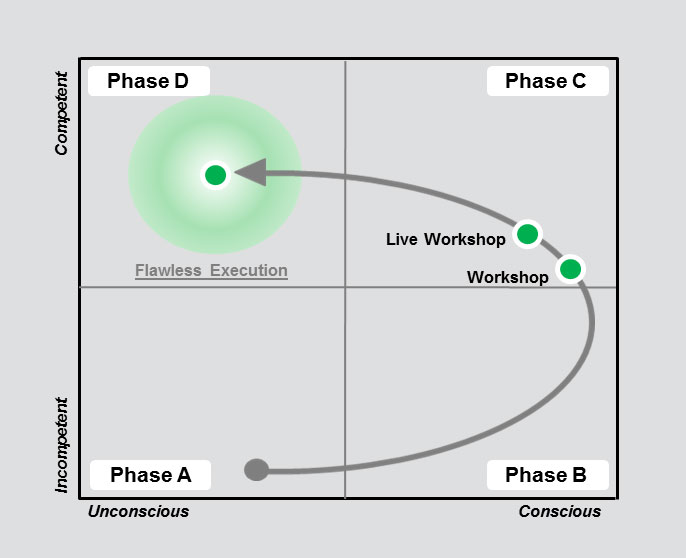 Many traders I meet at the Van Tharp Institue — both novices and veterans — have gone through periods of confusion, frustration, or maybe even outright desperation. Regularly I have witnessed how from such states they were then able to produce great improvements in their trading competence. It is astonishing to many, but ‘struggle’ is an important and necessary component for learning & growth. Follow your trading goals and you will eventually struggle or find resistance — be it mental or physical — before you achieve trader competence. Having gone through this same process myself, I have a passion to help others smooth-out the path to trader competence.
Many traders I meet at the Van Tharp Institue — both novices and veterans — have gone through periods of confusion, frustration, or maybe even outright desperation. Regularly I have witnessed how from such states they were then able to produce great improvements in their trading competence. It is astonishing to many, but ‘struggle’ is an important and necessary component for learning & growth. Follow your trading goals and you will eventually struggle or find resistance — be it mental or physical — before you achieve trader competence. Having gone through this same process myself, I have a passion to help others smooth-out the path to trader competence.
What is trading all about?
Many traders start out their journey searching for a ‘Holy Grail’ trading system. Unfortunately, this is a very time-consuming and exhaustive search which can take years. This journey typically leaves aspiring traders in frustration and all too often, the journey ends there with broken dreams left behind. Think about yourself: have you gone through a years-long search of that kind?
In reality, there is no such thing as a ‘magic system’ out there! True, a good system with an edge is the necessary starting point for your journey. Traders, however, need unconscious competence to be consistently profitable — and there are really no short-cuts to this state. After achieving competence, flawlessly executing a system in an unconscious competent way becomes easy — a seemingly automatic performance activity.
Why is trading so difficult to master?
I have a stong belief that Trading is a combination of Science (the intellect or the left brain) and Art (the intuition or the right brain). To join up the science-part of trading with the art-part of trading involves the whole brain — which makes the process challenging. This not only takes time and effort but the trader needs to transition through several developmental phases to become sufficiently competent enough to execute a strategy in a flawless way.
Typically, trading novices start out doing all the wrong things such as trying to trade countertrend moves or trying to pick tops and bottoms. Why is that? Because that’s the way the human brain is wired. You could say that ‘biology’ makes you actually lose automatically in the markets.

You may have heard Van state that ‘Trading is 100% Psychology”. Trading is a mental game that can be mastered but it requires building up new neural pathways. Some very useful behaviors in your daily life might need to be un-learned and re-learned to achieve trading success. The faster one comes to the conclusion that there is no ‘magic system’ out there, the easier trading competence can be achieved.
Building trading competence — a process that takes some time & effort
Typically a trader goes through four phases before achieving Trader Competence.
Phase A ‘Unconscious-Incompetence’: this is typically dominated by the thinking that trading is really easy and that traders just need to follow their guts. In phase B, a trader reaches ‘Conscious-Incompetence’ once it becomes evident that there is no Holy Grail out there — that one needs to aquire some competence first (either by developing a system on their own or by trading somebody elses). In this phase many traders come and attend a workshop at the Van Tharp Institute which helps moves them into ‘conscious-competence’ (phase C).
A trader who has entered phase C has already come a long way. He or she has learned all the necessary things to become successful. To use a dancing metaphor: learning all the dance steps one-by-one will not make you a great dancer right away. You need to deepen your knowledge and actually practice, practice and practice. Only if you can move your body seemingly without effort while doing the right steps, then you will have achieved ‘uncosncious-competence’ (phase D). This is the place where flawless execution of the trading plan happens. This is when you have achieved trader competence and consistent profitability. Welcome to the mental game of trading!

Main success factors for trader competence
I having closely followed the development of a number of trading students and have learned the following success factors seem to work best:
1. Build useful Neural Pathways early on
It is always easier to learn something the right way from the beginning rather than having to un-learn behaviors that were previously acquired.
2. Ride down your learning curve by transitioning through the Learning Stages
Follow your learning curve step-by-step by reducing complexity. Previous learnings should be integrated first before new ones are added. You will learn much faster if you increase complexity over time.
3. Be aware of your Learning Type and prepare accordingly
See article: What Learning Type Are You
4. Stay at the safety of the sidelines through Simulated Trading
Do not start trading the live markets right away. Learn to trade a system in a simulated environment until you can flawlessly execute it, ie without making mistakes anymore. A simulator accelerates your learning progress and you can trade many more opportunities than you would trading the live markets.
5. Become part of a Committed Group of traders
Trading does not need to be a solitary activity. Becoming part of a group accelerates your learning, keeps you motivated and it is much more fun. Make friends with your fellow students and follow up with them after the workshop.
6. Build your Chart Reading capabilities
The skill of being able to read price charts is a basic trader skill. Whatever system you trade, this is an important competence that you need to develop.
7. Grow your Market Intuition (gain ‘screentime’ with Simulations, Demo- and Live-markets)
Analyzing charts and trading the markets builds your chart reading. With more experience you will understand, or let’s better say you will start to ‘feel’ the market dynamics.
Many high-performance activities have the common goal of Achieving Mastery or unconscious-competence. Let’s close this article with a quote on “Swordmanship” that has stood the test of time. From the book ‘Zen & Japanese Culture’published in 1959 which quotes a much older text:
‘However well a man may be trained in the art, the swordsman can never be the master of his technical knowledge unless all his psychic hindrances are removed and he can keep his mind in the state of emptiness, even purged of whatever technique he has obtained. …only then will he be capable of displaying all the arts acquired by the training to its full extent. He will move as if automatically – with no conscious effort.’
I hope to see or hear from you soon,
Gabriel Grammatidis
PS from Gabriel — Part of my personal mission is to help others, to provide information, and to transfer knowledge so that your path of trader development becomes as smooth as possible. As more experienced traders will tell you, everybody needs to transition through certain learning stages and I enjoy helping new and experienced traders make those transitions. With every workshop, I too learn from you in how to be a better coach. I like to stay in touch with attendees once the workshop is over and I offer various degrees of mentoring support after each event.
